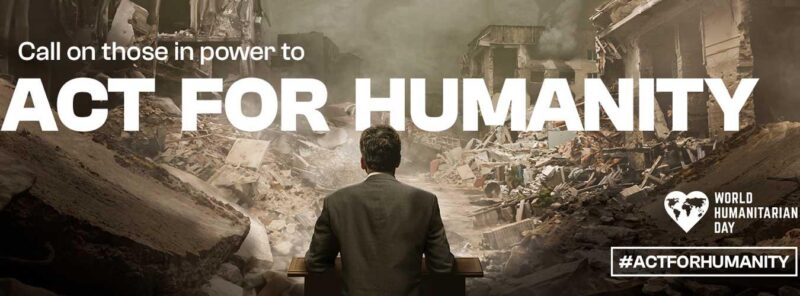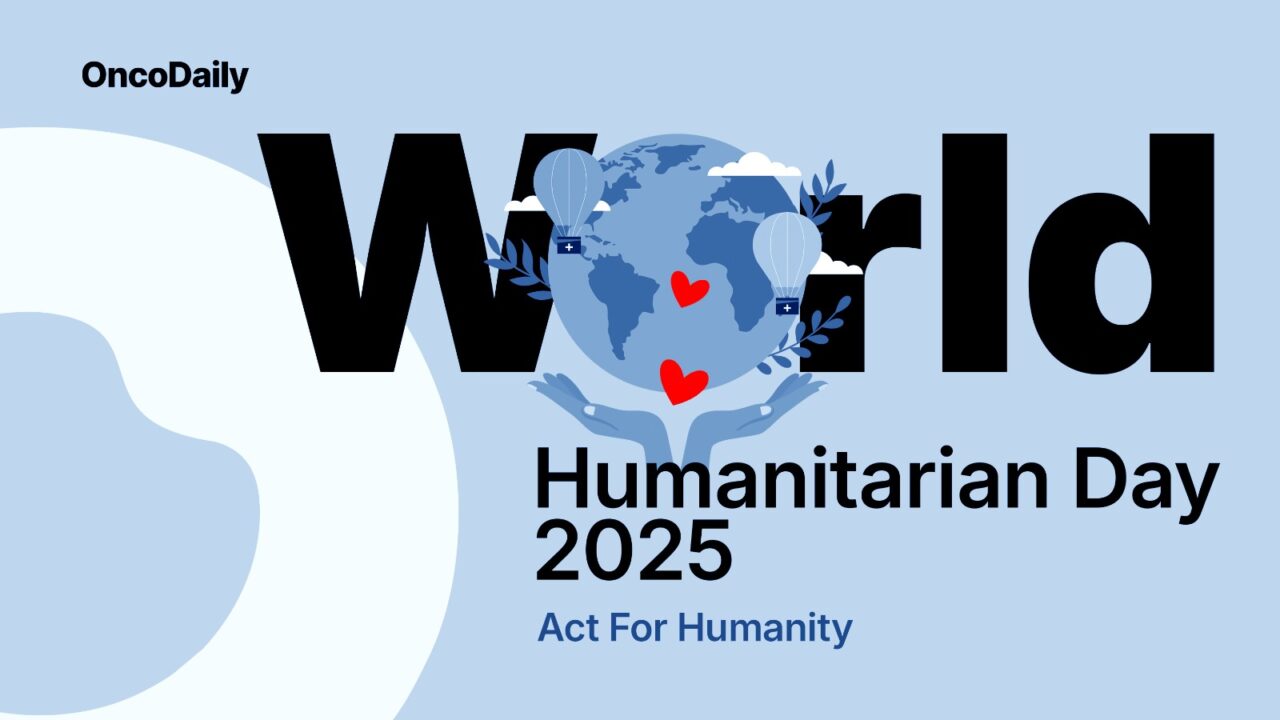On August 19, 2025, the world observes World Humanitarian Day, a day dedicated to recognizing the tireless efforts of humanitarian workers who risk their lives and dedicate their skills to support those in need. Established by the United Nations in 2008, WHD honors the thousands of aid workers who have lost their lives in the line of duty and highlights the importance of global solidarity in providing relief and support to the most vulnerable populations.
This year’s theme, #ActForHumanity, emphasizes the importance of global solidarity, protection, and accountability in humanitarian efforts.

“This year the message is clear: the humanitarian system is stretched to its limits; underfunded, overwhelmed and under attack: United Nations”
While often associated with disaster relief and emergency response, humanitarian work also plays a vital role in healthcare delivery, particularly in oncology. Cancer care in regions affected by conflict, displacement, or economic instability faces unique challenges. Patients often contend with limited access to hospitals, shortages of essential medications, disrupted treatment schedules, and insufficient healthcare personnel. Humanitarian organizations bridge these gaps, offering life-saving treatments, palliative care, and vital support for both patients and healthcare providers. Their work ensures that even in challenging environments, cancer care continues without interruption.
The Challenges of Oncology in Crisis Settings
Globally, millions of people live in areas impacted by natural disasters, poverty, or displacement. For cancer patients in these regions, the risk of delayed diagnosis, interrupted treatments, and poor health outcomes increases dramatically. According to the World Health Organization, non-communicable diseases, including cancer, account for more than 70% of deaths worldwide, with the majority occurring in low-resource settings. Humanitarian interventions are critical in addressing these disparities. By setting up mobile clinics, providing essential medications, and training local medical personnel, organizations ensure continuity of care, early diagnosis, and timely treatment.
The Meaning Behind World Humanitarian Day
World Humanitarian Day is more than just a commemoration, it is a reminder of the vital role that humanitarian efforts play in alleviating suffering and preserving human dignity. Humanitarian workers operate in some of the most challenging environments, from regions affected by natural disasters to communities impacted by conflict, displacement, and poverty. Their work encompasses emergency relief, healthcare, food security, shelter, education, and advocacy, often under dangerous and unpredictable conditions.
By observing WHD, the international community aims to raise awareness of the sacrifices made by these workers, highlight the ongoing humanitarian crises worldwide, and inspire individuals, governments, and organizations to support and strengthen aid initiatives.
Key Themes and Global Significance
The 2025 theme, #ActForHumanity, calls attention to the urgent need for global cooperation and accountability. It emphasizes that humanitarian action is not only about immediate assistance but also about long-term solutions, resilience, and the protection of human rights. Around the world, humanitarian crises, whether triggered by climate-related disasters, armed conflicts, or socio-economic instability, continue to affect millions of lives. According to the UN, in 2024, over 240 million people required humanitarian assistance globally, a figure that continues to grow due to escalating crises in multiple regions.
WHD encourages individuals and institutions to reflect on their role in supporting vulnerable populations. From policymakers to volunteers, everyone has a part to play in promoting humanitarian values, enhancing preparedness, and ensuring that relief efforts reach those who need them most.
Humanitarian Organizations Leading the Way
Institutions such as the International Committee of the Red Cross (ICRC) and Médecins Sans Frontières (MSF) have long been pioneers in delivering oncology care in resource-constrained and crisis-affected areas. Their initiatives include establishing mobile oncology units in remote locations, leveraging telemedicine to connect patients with specialists globally, and providing palliative care to patients who have limited access to hospitals. These programs not only save lives but also instill hope in communities, highlighting the profound human impact of dedicated humanitarian work.
Awareness Through Social Media
In addition to frontline interventions, social media plays a vital role in promoting awareness and mobilizing support. Hospitals, research centers, patient advocacy groups, and influencers shared posts highlighting the importance of World Humanitarian Day 2025, showcasing the work of healthcare teams and patients’ stories.
At OncoDaily, we have curated key highlights from these campaigns. These efforts amplify the message that humanitarian work saves lives, not only in emergencies but also in everyday healthcare challenges.
“In palliative care, humanity is in the quiet acts that bring dignity and comfort; listening and making sure no one walks alone.
Today, we thank all Humanitarians who stand with patients and families in life’s hardest moments, and who show through their actions that care can change lives.”
“On World Humanitarian Day, I’m reflecting on how AI is transforming humanitarian and development work in low- and middle-income countries. From poverty mapping in Nigeria to AI-powered pediatric care in Tanzania, agencies like World Bank, UNICEF, and Mercy Corps are innovating, but without strong local data and technology, AI risks misrepresenting realities and reinforcing inequality. The question is: will LMICs actively shape the AI revolution or passively inherit solutions designed elsewhere?”
“This is my reflection for World Humanitarian Day. It’s part personal story, part urgent call to defend the system that exists to serve those caught in crisis.
The humanitarian system is under attack – budgets, principles, and purpose alike – and that’s just profoundly wrong. If it breaks, it won’t be buildings or logos that fall. It will be people who suffer.”
Medical Students’ Union | FMAS | RUSL:
“Heroes
Heroes without even a single magical power
Reality,
Reality without even a twinkle of fantasy
In the darkest reality they are the human heroes
Come along with me, to celebrate the illuminators of humanity,
“Humanitarians” ”
Moving Forward: The Global Commitment
Commemorating World Humanitarian Day 2025 provides an opportunity to reflect on the essential role of humanitarian workers in oncology and healthcare at large. Their dedication ensures that cancer patients receive care even in the most difficult circumstances. By supporting their work, advocating for resilient health systems, and raising awareness about the challenges faced in crisis-affected regions, we all contribute to a world where no patient is left behind. Each action, whether donating to humanitarian programs, volunteering, or spreading awareness on social media, strengthens global healthcare resilience and promotes equity in cancer care.
Learn more about the #ActForHumanity campaign on the United Nation’s official website here.

Written by Sergey Badalyan, MD






